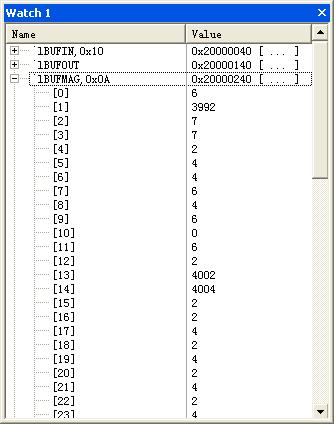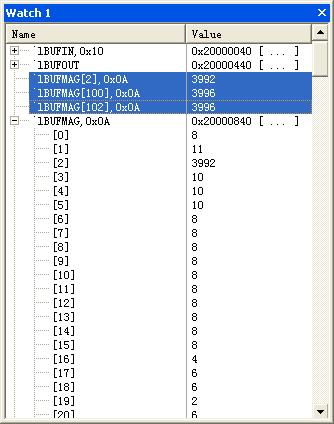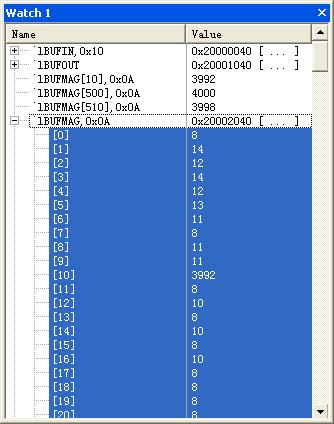/*
*********************************************************************************************************
FileName:dsp_asm.h
*********************************************************************************************************
*/
#ifndef __DSP_ASM_H__
#define __DSP_ASM_H__
*********************************************************************************************************
* FUNCTION PROTOTYPES
*********************************************************************************************************
*/
void dsp_asm_test(void);
void dsp_asm_init(void);
#endif /* End of module include. */
/*8888888888888888888888888888888888888888888888888888888888888888*/
/*8888888888888888888888888888888888888888888888888888888888888888*/
/*
* FileName:dsp_asm.c
* Author:Bobby.Chen
* Email:heroxx@163.com
* Date:2010-08-11
* Description:This file showes how to use the dsp library in mdk project.
* 使用三角函数生成采样点,供FFT计算
* 进行FFT测试时,按下面顺序调用函数即可:
* dsp_asm_init();
* dsp_asm_test();
*/
#include "stm32f10x.h"
#include "dsp_asm.h"
#include "stm32_dsp.h"
#include "table_fft.h"
#include <stdio.h>
#include <math.h>
/*
*********************************************************************************************************
* LOCAL CONSTANTS
*********************************************************************************************************
*/
#define PI2 6.28318530717959
// Comment the lines that you don't want to use.
// 要模拟FFT,请注释掉其他的预定义
// 此处也可以全部注释掉,在MDK的工程属性->"C/C++"->"Preprocessor Symbols"-"Define:"中添加NPT_XXX项目
// 但是这样做法的缺点是每次修改XXX数据,都会导致MDK下次编译时会编译全部文件,速度太慢。
//#define NPT_64 64
#define NPT_256 256
//#define NPT_1024 1024
// N=64,Fs/N=50Hz,Max(Valid)=1600Hz
// 64点FFt,采样率3200Hz,频率分辨率50Hz,测量最大有效频率1600Hz
#ifdef NPT_64
#define NPT 64
#define Fs 3200
#endif
// N=256,Fs/N=25Hz,Max(Valid)=3200Hz
// 256点FFt,采样率6400Hz,频率分辨率25Hz,测量最大有效频率3200Hz
#ifdef NPT_256
#define NPT 256
#define Fs 6400
#endif
// N=1024,Fs/N=5Hz,Max(Valid)=2560Hz
// 1024点FFt,采样率5120Hz,频率分辨率5Hz,测量最大有效频率2560Hz
#ifdef NPT_1024
#define NPT 1024
#define Fs 5120
#endif
/*
*********************************************************************************************************
* LOCAL GLOBAL VARIABLES
*********************************************************************************************************
*/
extern uint16_t TableFFT[];
long lBUFIN[NPT]; /* Complex input vector */
long lBUFOUT[NPT]; /* Complex output vector */
long lBUFMAG[NPT];/* Magnitude vector */
/*
*********************************************************************************************************
* LOCAL FUNCTION PROTOTYPES
*********************************************************************************************************
*/
void dsp_asm_powerMag(void);
/*
*********************************************************************************************************
* Initialize data tables for lBUFIN
* 模拟采样数据,采样数据中包含3种频率正弦波:50Hz,2500Hz,2550Hz
* lBUFIN数组中,每个单元数据高字(高16位)中存储采样数据的实部,低字(低16位)存储采样数据的虚部(总是为0)
*********************************************************************************************************
*/
void dsp_asm_init()
{
u16 i=0;
float fx;
for(i=0;i<NPT;i++)
{
fx = 4000 * sin(PI2*i*50.0/Fs) + 4000 * sin(PI2*i*2500.0/Fs) + 4000*sin(PI2*i*2550.0/Fs);
lBUFIN = ((s16)fx)<<16;
}
}
/*
*********************************************************************************************************
* Test FFT,calculate powermag
* 进行FFT变换,并计算各次谐波幅值
*********************************************************************************************************
*/
void dsp_asm_test()
{
// 根据预定义选择合适的FFT函数
#ifdef NPT_64
cr4_fft_64_stm32(lBUFOUT, lBUFIN, NPT);
#endif
#ifdef NPT_256
cr4_fft_256_stm32(lBUFOUT, lBUFIN, NPT);
#endif
#ifdef NPT_1024
cr4_fft_1024_stm32(lBUFOUT, lBUFIN, NPT);
#endif
// 计算幅值
dsp_asm_powerMag();
// printf("No. Freq Power ");
// for(i=0;i<NPT/2;i++)
// {
// printf("%4d,%4d,%10d,%10d,%10d ",i,(u16)((float)i*Fs/NPT),lBUFMAG,(lBUFOUT>>16),(lBUFOUT&0xffff));
// }
// printf("*********END********** ");
}
/*
*********************************************************************************************************
* Calculate powermag
* 计算各次谐波幅值
* 先将lBUFOUT分解成实部(X)和虚部(Y),然后计算赋值(sqrt(X*X+Y*Y)
*********************************************************************************************************
*/
void dsp_asm_powerMag(void)
{
s16 lX,lY;
u32 i;
for(i=0;i<NPT/2;i++)
{
lX = (lBUFOUT << 16) >> 16;
lY = (lBUFOUT >> 16);
{
float X = NPT * ((float)lX) /32768;
float Y = NPT * ((float)lY) /32768;
float Mag = sqrt(X*X + Y*Y)/NPT;
lBUFMAG = (u32)(Mag * 65536);
}
}
}
// 笔者使用的是金牛开发板,CPU为STM32F107VC;JLink V8,MDK-ARM 4.10
// 注意FFT运算结果的对称性,也即256点的运算结果,只有前面128点的数据是有效可用的。
// 64点FFT运算结果图(局部):

FFT_64 (原文件名:1.JPG)
上图中,数组下标X对应的谐波频率为:N×Fs/64=N×3200/64=N*50Hz.
lBUFMAG[1] 对应 50Hz谐波幅值
上图中由于FFT分辨率50HZ,最大只能识别1600Hz谐波,导致结果中出现错误的数据。
// 256点FFT运算结果图(局部):

FFT_256 (原文件名:2.JPG)
上图中,数组下标X对应的谐波频率为:N×Fs/256=N×6400/256=N*25Hz.
lBUFMAG[2] 对应 2×25 =50Hz谐波幅值
lBUFMAG[100] 对应 100×25=2500Hz谐波幅值
lBUFMAG[102] 对应 102×25=2550Hz谐波幅值
// 1024点FFT运算结果图(局部):

FFT_1024 (原文件名:3.JPG)
上图中,数组下标X对应的谐波频率为:N×Fs/1024=N×5120/1024=N*5Hz.
lBUFMAG[10] 对应 10×5 =50Hz谐波幅值
lBUFMAG[500] 对应 500×5=2500Hz谐波幅值
lBUFMAG[510] 对应 510×5=2550Hz谐波幅值
FFT_Code示例代码FFT2.zip(文件大小:490K) (原文件名:FFT2.zip)
更正:
文件dsp_g2.c中dsp_asm_powerMag函数应按如下方式更改:
void dsp_asm_powerMag(void)
{
s16 lX,lY;
u32 i;
for(i=0;i<NPT/2;i++)
{
lX = (lBUFOUT << 16) >> 16;
lY = (lBUFOUT >> 16);
{
float X = NPT * ((float)lX) /32768;
float Y = NPT * ((float)lY) /32768;
float Mag = sqrt(X*X + Y*Y)/NPT;
if(i==0)
lBUFMAG = (u32)(Mag * 32768);
else
lBUFMAG = (u32)(Mag * 65536);
}
}
}
原因在于计算幅值时直流分量的幅值为sqrt(X*X+Y*Y)/NPT,不用除2
*********************************************************************************************************
FileName:dsp_asm.h
*********************************************************************************************************
*/
#ifndef __DSP_ASM_H__
#define __DSP_ASM_H__
*********************************************************************************************************
* FUNCTION PROTOTYPES
*********************************************************************************************************
*/
void dsp_asm_test(void);
void dsp_asm_init(void);
#endif /* End of module include. */
/*8888888888888888888888888888888888888888888888888888888888888888*/
/*8888888888888888888888888888888888888888888888888888888888888888*/
/*
* FileName:dsp_asm.c
* Author:Bobby.Chen
* Email:heroxx@163.com
* Date:2010-08-11
* Description:This file showes how to use the dsp library in mdk project.
* 使用三角函数生成采样点,供FFT计算
* 进行FFT测试时,按下面顺序调用函数即可:
* dsp_asm_init();
* dsp_asm_test();
*/
#include "stm32f10x.h"
#include "dsp_asm.h"
#include "stm32_dsp.h"
#include "table_fft.h"
#include <stdio.h>
#include <math.h>
/*
*********************************************************************************************************
* LOCAL CONSTANTS
*********************************************************************************************************
*/
#define PI2 6.28318530717959
// Comment the lines that you don't want to use.
// 要模拟FFT,请注释掉其他的预定义
// 此处也可以全部注释掉,在MDK的工程属性->"C/C++"->"Preprocessor Symbols"-"Define:"中添加NPT_XXX项目
// 但是这样做法的缺点是每次修改XXX数据,都会导致MDK下次编译时会编译全部文件,速度太慢。
//#define NPT_64 64
#define NPT_256 256
//#define NPT_1024 1024
// N=64,Fs/N=50Hz,Max(Valid)=1600Hz
// 64点FFt,采样率3200Hz,频率分辨率50Hz,测量最大有效频率1600Hz
#ifdef NPT_64
#define NPT 64
#define Fs 3200
#endif
// N=256,Fs/N=25Hz,Max(Valid)=3200Hz
// 256点FFt,采样率6400Hz,频率分辨率25Hz,测量最大有效频率3200Hz
#ifdef NPT_256
#define NPT 256
#define Fs 6400
#endif
// N=1024,Fs/N=5Hz,Max(Valid)=2560Hz
// 1024点FFt,采样率5120Hz,频率分辨率5Hz,测量最大有效频率2560Hz
#ifdef NPT_1024
#define NPT 1024
#define Fs 5120
#endif
/*
*********************************************************************************************************
* LOCAL GLOBAL VARIABLES
*********************************************************************************************************
*/
extern uint16_t TableFFT[];
long lBUFIN[NPT]; /* Complex input vector */
long lBUFOUT[NPT]; /* Complex output vector */
long lBUFMAG[NPT];/* Magnitude vector */
/*
*********************************************************************************************************
* LOCAL FUNCTION PROTOTYPES
*********************************************************************************************************
*/
void dsp_asm_powerMag(void);
/*
*********************************************************************************************************
* Initialize data tables for lBUFIN
* 模拟采样数据,采样数据中包含3种频率正弦波:50Hz,2500Hz,2550Hz
* lBUFIN数组中,每个单元数据高字(高16位)中存储采样数据的实部,低字(低16位)存储采样数据的虚部(总是为0)
*********************************************************************************************************
*/
void dsp_asm_init()
{
u16 i=0;
float fx;
for(i=0;i<NPT;i++)
{
fx = 4000 * sin(PI2*i*50.0/Fs) + 4000 * sin(PI2*i*2500.0/Fs) + 4000*sin(PI2*i*2550.0/Fs);
lBUFIN = ((s16)fx)<<16;
}
}
/*
*********************************************************************************************************
* Test FFT,calculate powermag
* 进行FFT变换,并计算各次谐波幅值
*********************************************************************************************************
*/
void dsp_asm_test()
{
// 根据预定义选择合适的FFT函数
#ifdef NPT_64
cr4_fft_64_stm32(lBUFOUT, lBUFIN, NPT);
#endif
#ifdef NPT_256
cr4_fft_256_stm32(lBUFOUT, lBUFIN, NPT);
#endif
#ifdef NPT_1024
cr4_fft_1024_stm32(lBUFOUT, lBUFIN, NPT);
#endif
// 计算幅值
dsp_asm_powerMag();
// printf("No. Freq Power ");
// for(i=0;i<NPT/2;i++)
// {
// printf("%4d,%4d,%10d,%10d,%10d ",i,(u16)((float)i*Fs/NPT),lBUFMAG,(lBUFOUT>>16),(lBUFOUT&0xffff));
// }
// printf("*********END********** ");
}
/*
*********************************************************************************************************
* Calculate powermag
* 计算各次谐波幅值
* 先将lBUFOUT分解成实部(X)和虚部(Y),然后计算赋值(sqrt(X*X+Y*Y)
*********************************************************************************************************
*/
void dsp_asm_powerMag(void)
{
s16 lX,lY;
u32 i;
for(i=0;i<NPT/2;i++)
{
lX = (lBUFOUT << 16) >> 16;
lY = (lBUFOUT >> 16);
{
float X = NPT * ((float)lX) /32768;
float Y = NPT * ((float)lY) /32768;
float Mag = sqrt(X*X + Y*Y)/NPT;
lBUFMAG = (u32)(Mag * 65536);
}
}
}
// 笔者使用的是金牛开发板,CPU为STM32F107VC;JLink V8,MDK-ARM 4.10
// 注意FFT运算结果的对称性,也即256点的运算结果,只有前面128点的数据是有效可用的。
// 64点FFT运算结果图(局部):

FFT_64 (原文件名:1.JPG)
上图中,数组下标X对应的谐波频率为:N×Fs/64=N×3200/64=N*50Hz.
lBUFMAG[1] 对应 50Hz谐波幅值
上图中由于FFT分辨率50HZ,最大只能识别1600Hz谐波,导致结果中出现错误的数据。
// 256点FFT运算结果图(局部):

FFT_256 (原文件名:2.JPG)
上图中,数组下标X对应的谐波频率为:N×Fs/256=N×6400/256=N*25Hz.
lBUFMAG[2] 对应 2×25 =50Hz谐波幅值
lBUFMAG[100] 对应 100×25=2500Hz谐波幅值
lBUFMAG[102] 对应 102×25=2550Hz谐波幅值
// 1024点FFT运算结果图(局部):

FFT_1024 (原文件名:3.JPG)
上图中,数组下标X对应的谐波频率为:N×Fs/1024=N×5120/1024=N*5Hz.
lBUFMAG[10] 对应 10×5 =50Hz谐波幅值
lBUFMAG[500] 对应 500×5=2500Hz谐波幅值
lBUFMAG[510] 对应 510×5=2550Hz谐波幅值
FFT_Code示例代码FFT2.zip(文件大小:490K) (原文件名:FFT2.zip)
更正:
文件dsp_g2.c中dsp_asm_powerMag函数应按如下方式更改:
void dsp_asm_powerMag(void)
{
s16 lX,lY;
u32 i;
for(i=0;i<NPT/2;i++)
{
lX = (lBUFOUT << 16) >> 16;
lY = (lBUFOUT >> 16);
{
float X = NPT * ((float)lX) /32768;
float Y = NPT * ((float)lY) /32768;
float Mag = sqrt(X*X + Y*Y)/NPT;
if(i==0)
lBUFMAG = (u32)(Mag * 32768);
else
lBUFMAG = (u32)(Mag * 65536);
}
}
}
原因在于计算幅值时直流分量的幅值为sqrt(X*X+Y*Y)/NPT,不用除2
友情提示: 此问题已得到解决,问题已经关闭,关闭后问题禁止继续编辑,回答。
回复【50楼】moyuker
-----------------------------------------------------------------------
你好,最近小弟看了下你的程序,有个问题,是不是stm32库做fft处理受频率限制,最高频率也是用256点时的3200hz啊??
-----------------------------------------------------------------------
频率分辨率=采样频率/FFT点数
256点FFt,采样率6400Hz
频率分辨率6400/256=25Hz,测量最大有效频率6400/2=3200Hz
一周热门 更多>